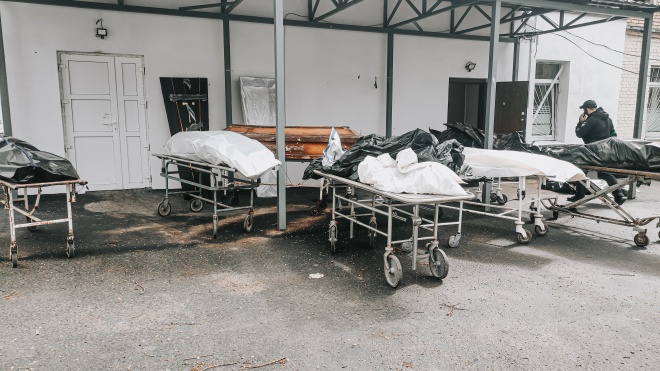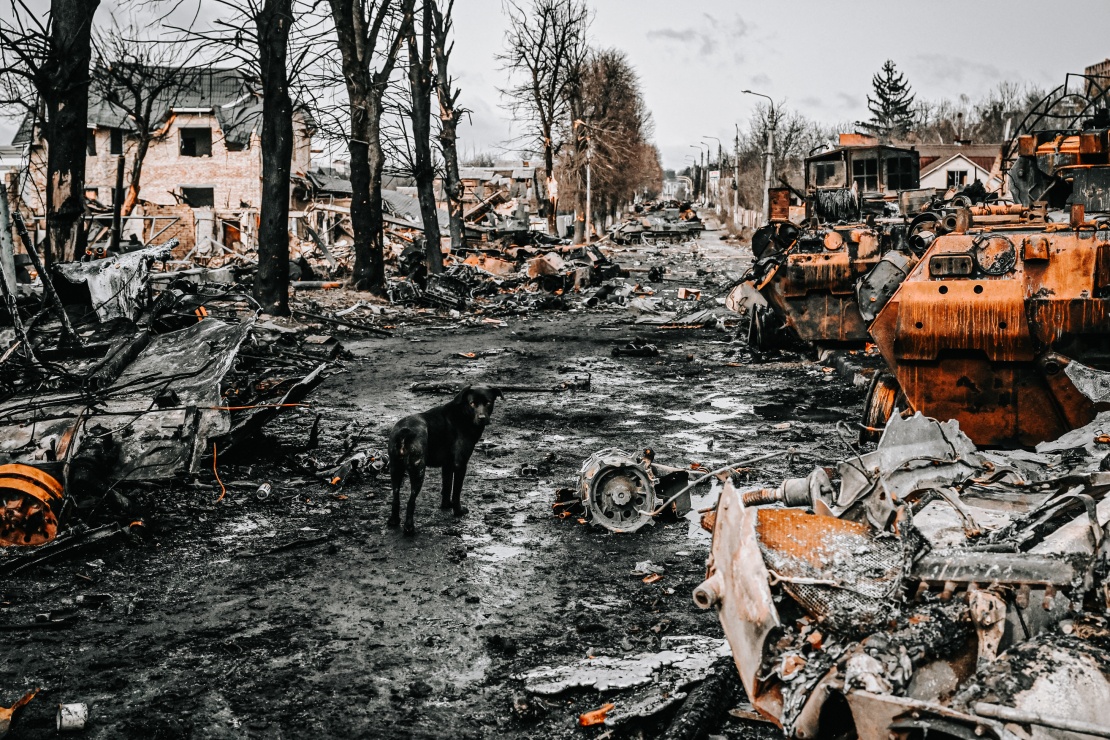Iʼm 20 years old, I live on Yablunska Street with my mother and grandmother. Until February 24, I studied hairdressing and worked. Our seven-story building isnʼt far from Gostomel. On the first day, I did not believe that the invasion had begun, I walked to my friendʼs house in Irpin. There was such a roar from the planes that we fell to the floor in the apartment. I was in Bucha until March 8 and didnʼt go down to the shelter. The basement was not suitable for hiding there, and I felt sick. Therefore, I was in the apartment on the 6th floor.
On the twenty-fourth of February, my dad was in the hospital in Boyarka — he had a closed form of tuberculosis. They were told to leave the hospital, so on February 27 he came to Bucha on foot. My parents divorced, and he lived alone in a garage on Sklozavodska street. He insulated it, made it like a one-room apartment. He was like this: drank a little, made his own decisions. He worked as a fitter at the Antonov aircraft plant in Gostomel. Dad helped everyone in the district, he was kind and unfailing.
We talked with him until March 1-2. And then Russian tanks entered our area, communication was lost. Sometimes I managed to catch a signal, and then I transmitted information about the movement of Russian troops to the SSU. I just saw them circling in my yard from the window. Day and night, something was transported, bodies were taken away — without pauses. And on March 5, our house was hit.
Getty Images / «Babel'»
On March 8, I told my mother that I couldnʼt stand it, and we went to the evacuation to Irpin, to the Romanivsky Bridge. We got to Kyiv, and from there to the Transcarpathian region of Ukraine. Grandma decided to stay, there was no more contact with dad. I knew absolutely nothing about him.
When Bucha was liberated, we learned that my grandmother had been injured. She convinced us not to return yet, so we lived in Cherkasy for a while, and then in Kyiv. I returned to Bucha on May 1.
I found out that dad was missing on the 24th or 25th of April. We hoped he had gone somewhere and couldnʼt charge his phone. There was one strange story — on March 4, dad appeared as a new user in Telegram. Then there was a weak connection, and my mother and I received a notification. But I knew it couldnʼt be him — he doesnʼt use social networks, he just bought a smartphone the day before, and I was setting it up for him. I then wrote to "him" on behalf of my mother: "Hello, why are you missing?" The user was online, but as soon as he read the message, he deleted the account. I know my father definitely couldnʼt do that. But then I still didnʼt think that something had happened to him, and my mother even wanted to visit him in the garage.
The fatherʼs friends filed a search warrant, provided a photo of him in a red T-shirt. A man in such clothes was found at Yablunska Street, 144, but he was a Territorial Defense soldier. My dad couldnʼt be in Territorial Defense.
And then at the morgue they told me that the leg came from the garage cooperative. In his jeans pocket was a wallet with melted down Dadʼs bank card. This limb arrived in a separate package. So medics wrote in the documents that this is probably my father. It really is his jeans and his belt. But there were no more remains of the body.
It turned out that dad and other people were burned in the garage. A friend of the parents said that it happened around 5 PM on March 3. It wasnʼt in my dadʼs garage, it was in one womanʼs garage. She was a bit strange: didnʼt have a car, but did have a garage. Therefore, she arranged a "basement" in the pit for repairs. Other people from the garages said they heard shots being fired at the garages. And they also heard how one Russian asked another: "This is the fifth, what to do with him?" They answered him: "Astra, throw him in the basement." My dadʼs body was found there. But it isnʼt known whether whey threw him there and burned him alive or he was already shot.
For the first time the basement where dad was was inspected in April, but that inspection was of bad quality. Then they found only his leg and two more legs of unidentified people — just what was easy to find.
I was only able to get into this garage in September. Everything was burnt inside. The foreign delegation I was with had searchlights, and under their bright light everything was visible in white ash. I tripped over bones and thatʼs how we found human remains.
There are different versions of what happened in the garage. The police say that people were shot first, and then set on fire: there they found bullet casings of different calibers, allegedly used by the 64th and 36th brigades [of the Russian Armed Forces]. No one heard the sounds of explosions there, that is, it was not a projectile hit. If a grenade had been thrown, the garage would not have burned down like that. Perhaps they were first doused with gasoline and then set on fire, because there are such marks on the bones. But there was no gasoline in the garage itself, because the owner did not have a car.
The father was buried as an "unknown person" under number 320. French specialists took DNA samples on September 3, but the results are not yet available. Too many people provided the samples. I was not allowed to bury my father under his name, because there is allegedly no reason for this. The investigators stated that he "may have been killed, or may have been disappeared." There is no document that the father was killed.
I wanted to bury my dad in a different way, I was waiting for the results of the DNA tests. But I couldnʼt. They say theyʼll be able to exhume him later, but I think when they let me, Iʼll just change the sign on the grave to have his name on it.
I helped others with their bodies, but I couldnʼt help myself — thatʼs how it turned out. When I returned to Bucha, I wrote to the city council that I want to volunteer. I was offered to join the initiative to find and identify people. I said I wasnʼt afraid and agreed. I wanted to work specifically with bodies, because many refused, and I knew that it would be difficult to cope with. We have made a Telegram channel for family recognition. Sometimes even relatives could not look at the bodies, so I looked at the photos for them, asked about the details. There was chaos, we were not prepared for so many people killed. But we did everything with the help of volunteers both in the information center and in the morgue. We no longer run the channel, but we are still completing the creation of the database of the dead.
I treated it like a job that someone had to do. But at the same time I thought: "Why did they kill this innocent person?" I just pulled myself together and decided that I would help, no matter how difficult it was for me.
Getty Images / «Babel'»
Translated from Ukrainian by Anton Semyzhenko.
Help Babel name the victims of Russians — support us: via Patreon 🔸 [email protected]🔸donate in cryptocurrency🔸in Ukrainian hryvnia.

